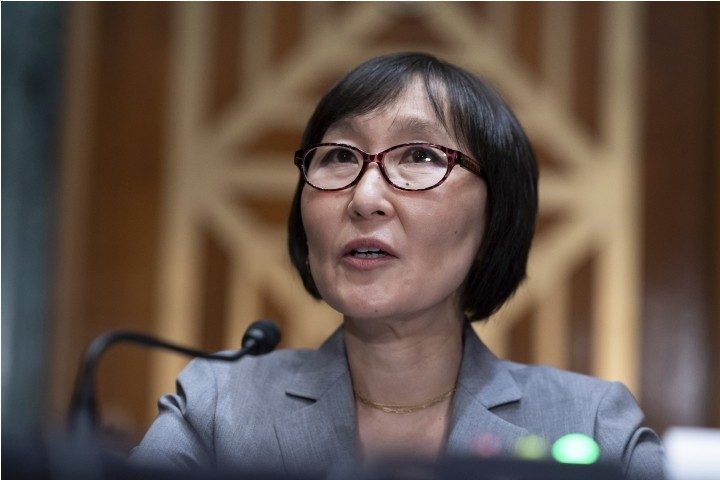
Thanks to weeks of pressure from legislators who found out about her red vision for U.S. banking, Saule T. Omarova has withdrawn as a nominee for Comptroller of the Currency.
The Soviet-born leftist, who would become the chief regulator of American banks, wants to end “banking as we know it” by nationalizing the industry, and to give regulatory control to a panel of university eggheads.
Understandably, bankers and the congressmen who represent them were unnerved. Who, on Earth, they must have wondered, would think it’s a good idea to give regulatory control of U.S. banks to an individual who wants to eliminate them?
Sleepy Joe Biden, that’s who.
Karl Marx Fan
Omarova’s nomination began foundering when her radical past and views, largely hidden from the public, bubbled to the surface.
“Omarova thinks asset prices, pay scales, capital and credit should be dictated by the federal government,” the Wall Street Journal opined:
In two papers, she has advocated expanding the Federal Reserve’s mandate to include the price levels of “systemically important financial assets” as well as worker wages. As they like to say at the modern university, “from each according to her ability to each according to her needs.”
But that wasn’t all. In a paper called “The People’s Ledger,” she said the Federal Reserve should control consumer bank deposits, which would “effectively ‘end banking’ as we know it” by becoming “the ultimate public platform for generating, modulating, and allocating financial resources in a modern economy.”
She also wants to put banks under the control of a “National Investment Authority,” which would in turn fall under the regulatory gaze of academics who would be free of the “constraints and requirements of the administrative process.”
As comptroller, Ms. Omarova would supervise some 1,200 financial institutions. While she couldn’t enact her People’s Agenda without legislation, she would have sweeping powers to punish banks that don’t follow her diktats.…
The President nominated Ms. Omarova over the objections of Treasury Secretary Janet Yellen, to whom the comptroller reports. One theory for this bizarre nomination is that Mr. Biden is trying to appease progressives because he plans to reappoint Jerome Powell as Fed chairman. Democratic Senators have rubber-stamped all but a few of Mr. Biden’s nominees, but Ms. Omarova is the wrong nominee for the wrong industry in the wrong country in the wrong century.
“Her proposals to effectively nationalize America’s community banks, end regulatory tailoring based on risk and eliminate the dual banking system are particularly troubling,” American Banking Association CEO Rob Nichols told DailyMail.com.
Indeed.
Beside that, though, Omarova scrubbed her undergraduate thesis on Karl Marx from her résumé, which required Senator Pat Toomey (R-Pa.) to ask for a copy.
Also in question was Omarova’s grasp of basic economic data.
“Until I came to the US, I couldn’t imagine that things like gender pay gap still existed in today’s world,” she tweeted in 2019. Say what you will about old USSR, there was no gender pay gap there. Market doesn’t always ‘know best.’”
In fact, the so-called gender pay gap — that women earn just 77 cents for every $1 a man earns — is fiction.
The data show that wages and salaries are about equal when the comparison is for men and women who work the same jobs and hours. The “gap” turns up when the comparison does not account for the different jobs women do and fewer hours they work.
Omarova should know that.
Dasvidaniya, Saule
The hubbub was too much. Omarova withdrew yesterday.
“At this point in the process, however, it is no longer tenable for me to continue as a Presidential nominee,” she wrote to White House personnel chief Catherine Russell.
Biden disgorged the obligatory cant:
As a strong advocate for consumers and a staunch defender of the safety and soundness of our financial system, Saule would have brought invaluable insight and perspective to our important work on behalf of the American people. But unfortunately, from the very beginning of her nomination, Saule was subjected to inappropriate personal attacks that were far beyond the pale.
As the Journal observed in its editorial about the wrecked nomination, the statement suggested, as New York Times put it, that “Omarova’s Soviet childhood meant that she could not be trusted.”
Not so, the newspaper rightly said:
The issue isn’t where she was from but that she hadn’t disavowed her radical views about the U.S. financial system.…
The U.S. doesn’t need a bank regulator who wants to end banking as we know it.
In late November, five Senate Democrats said they would oppose her, including three on the banking committee. They cited her support for nationalizing banks. They did not mention her birth in Kazakhstan.



